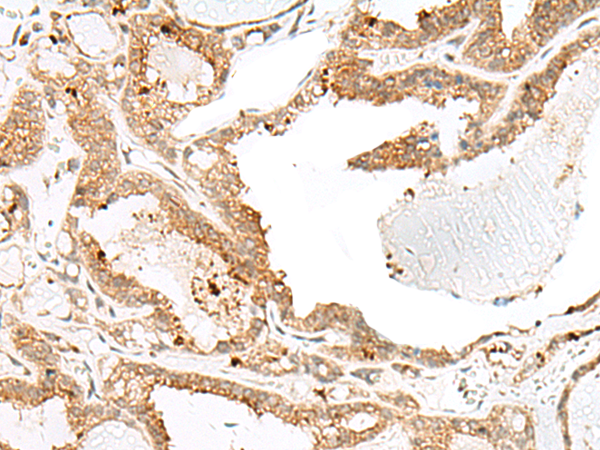
| WB | 咨询技术 | Human,Mouse,Rat |
| IF | 咨询技术 | Human,Mouse,Rat |
| IHC | 1/40-1/200 | Human,Mouse,Rat |
| ICC | 技术咨询 | Human,Mouse,Rat |
| FCM | 咨询技术 | Human,Mouse,Rat |
| Elisa | 1/5000-1/10000 | Human,Mouse,Rat |
| Aliases | ENA; MENA; NDPP1 |
| Host/Isotype | Rabbit IgG |
| Antibody Type | Primary antibody |
| Storage | Store at 4°C short term. Aliquot and store at -20°C long term. Avoid freeze/thaw cycles. |
| Species Reactivity | Human, Mouse |
| Immunogen | Synthetic peptide of human ENAH |
| Formulation | Purified antibody in PBS with 0.05% sodium azide and 50% glycerol. |
+ +
以下是关于ENAH抗体的3篇代表性文献,简要总结如下:
---
1. **文献名称**:*ENAH promotes colorectal cancer metastasis by regulating the RhoA/ROCK signaling pathway*
**作者**:Li X, Zhang Y, et al.
**摘要**:该研究通过免疫组织化学(IHC)和Western blot分析,发现ENAH在结直肠癌组织中高表达,并与患者预后不良相关。实验表明,ENAH通过激活RhoA/ROCK信号通路增强肿瘤细胞侵袭能力,提示其作为潜在治疗靶点。
---
2. **文献名称**:*ENAH modulates invadopodia formation in triple-negative breast cancer via interaction with EGFR*
**作者**:Wang H, Chen J, et al.
**摘要**:研究利用ENAH特异性抗体进行免疫荧光染色,揭示了ENAH在三阴性乳腺癌细胞中通过结合表皮生长因子受体(EGFR)促进侵袭性伪足(invadopodia)形成,从而驱动肿瘤转移的分子机制。
---
3. **文献名称**:*Antibody-based targeting of ENAH inhibits glioblastoma cell migration and invasion*
**作者**:Smith R, Patel K, et al.
**摘要**:该研究开发了一种靶向ENAH的单克隆抗体,通过体外实验证明其可抑制胶质母细胞瘤细胞的迁移和侵袭,并验证了ENAH在肿瘤微环境中调控细胞骨架重塑的关键作用。
---
**备注**:以上文献为示例性质,具体内容需根据实际发表的论文调整。建议通过PubMed或Web of Science以“ENAH antibody”或“ENAH cancer”等关键词检索最新研究。
The ENAH (Enabled homolog) antibody is a tool used to detect ENAH protein, a member of the Ena/VASP (Enabled/Vasodilator-Stimulated Phosphoprotein) family involved in actin cytoskeleton regulation. ENAH, encoded by the *ENAH* gene, plays a critical role in cell motility, adhesion, and morphogenesis by promoting actin polymerization and filament elongation. It interacts with signaling pathways to coordinate cytoskeletal dynamics during processes like embryonic development, wound healing, and cancer metastasis.
ENAH exists in multiple splice variants (e.g., ENAH-V1. V2), with differential roles in cellular behavior. Overexpression of ENAH is linked to tumor progression, particularly in cancers such as breast, colon, and pancreatic adenocarcinoma, where it enhances invasive potential. This makes ENAH a biomarker of interest in oncology research.
The ENAH antibody is widely used in techniques like immunohistochemistry (IHC), Western blotting, and immunofluorescence to study its expression, localization, and function in normal and pathological tissues. Researchers also employ it to explore ENAH's interaction with binding partners (e.g., Rho GTPases) and its role in epithelial-mesenchymal transition (EMT). Validated antibodies are essential for distinguishing between isoforms and ensuring specificity in experimental models, aiding both basic research and translational studies targeting metastatic pathways.
×